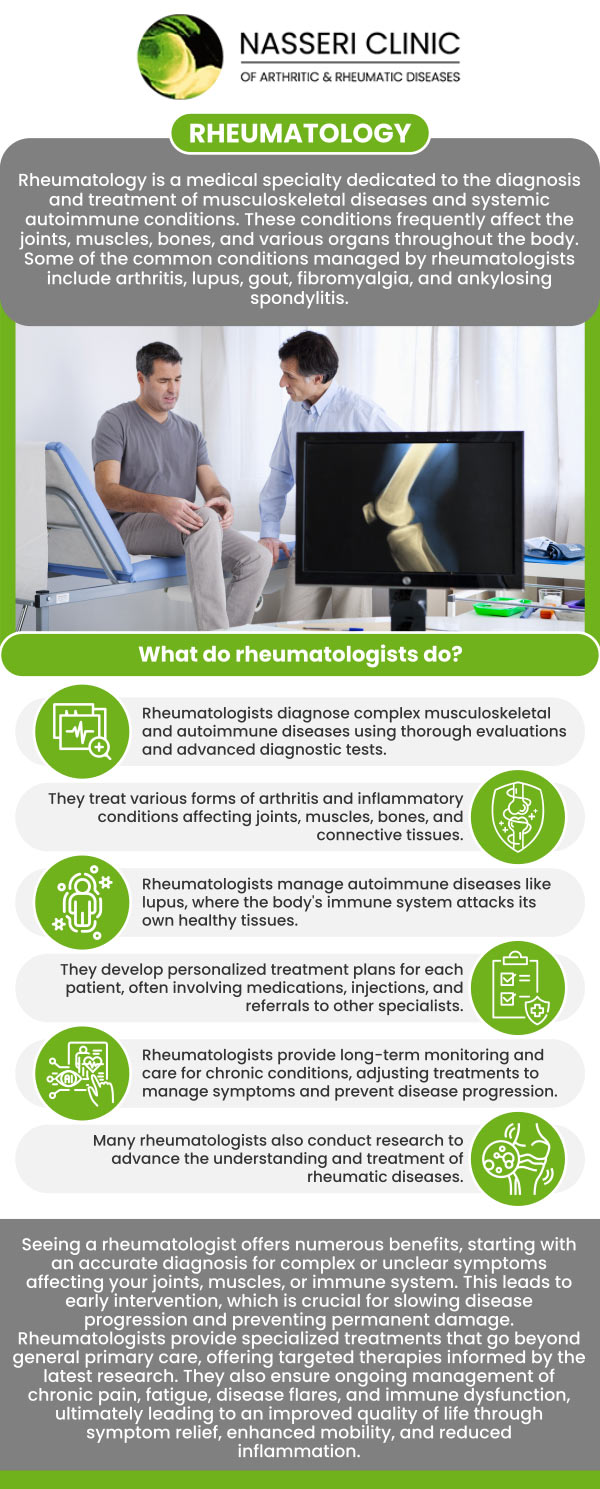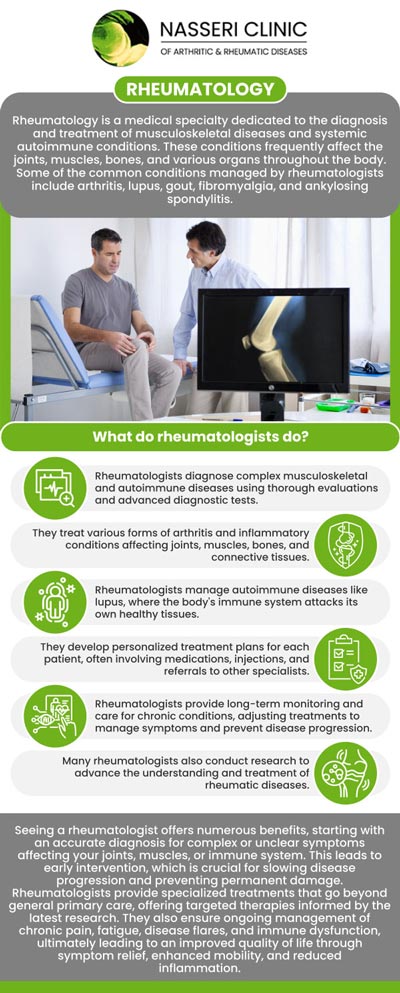How Can a Rheumatologist in Edgewater, MD Help Manage Your Condition?
The board-certified rheumatologists at Nasseri Clinic of Arthritic and Rheumatic Diseases in Edgewater, MD, can play a crucial role in managing your chronic conditions like arthritis, lupus, and other musculoskeletal disorders. By providing personalized treatment plans, and ongoing care, rheumatologists help alleviate symptoms, reduce inflammation, and improve overall quality of life. For more information, contact us or book an appointment online. We are conveniently located at 3168 Braverton St., Suite 330B, Edgewater, MD 21037.


Table of Contents:
What specific conditions, such as rheumatoid arthritis or lupus, do rheumatologists specialize in treating?
What is the importance of early diagnosis for conditions like arthritis, and when should I seek a rheumatologist?
What makes seeing a rheumatologist important for early diagnosis?
Rheumatologists are specialists in diagnosing and managing a wide range of autoimmune and inflammatory conditions that affect the joints, muscles, and bones. Their expertise goes beyond general joint pain, focusing on the root cause of these systemic diseases. This specialized focus allows them to offer precise and effective care for complex and often misunderstood illnesses. The most common conditions they specialize in treating include:
• Rheumatoid Arthritis (RA): A chronic inflammatory disorder that can affect not only your joints but also other organs.
• Lupus (Systemic Lupus Erythematosus): An autoimmune disease that can impact multiple organ systems, including the skin, joints, and kidneys.
• Psoriatic Arthritis: A form of arthritis that affects some people with psoriasis.
• Ankylosing Spondylitis: A type of arthritis that primarily affects the spine, leading to long-term pain and stiffness.
• Gout: A painful form of arthritis caused by the buildup of uric acid crystals in the joints.
• Scleroderma: A group of rare diseases that involve the hardening and tightening of the skin and connective tissues.
This is a partial list of the many complex conditions that rheumatologists are trained to diagnose and manage, helping patients find relief and improve their quality of life.
An early and accurate diagnosis is one of the most critical factors in successfully managing a rheumatological condition and preventing long-term damage. Many of these diseases, such as rheumatoid arthritis, are progressive. If left untreated, they can cause irreversible joint damage, deformity, and disability. Early intervention with a rheumatologist allows for:
Disease Modification: Beginning treatment with disease-modifying antirheumatic drugs (DMARDs) or biologics can slow or even halt the progression of the disease.
Symptom Control: Early treatment can help control pain, inflammation, and stiffness, allowing you to maintain your quality of life and continue with daily activities.
Damage Prevention: By controlling inflammation, a rheumatologist can help protect your joints and organs from permanent damage, preserving your function and mobility for years to come.
Improved Long-Term Outlook: An early diagnosis can lead to a more effective, long-term treatment plan that minimizes the impact of the disease on your daily life, career, and personal relationships. It’s about preserving your health for the future.
You should seek a rheumatologist as soon as you experience persistent joint pain or other concerning symptoms. Don’t wait until the condition has already progressed to the point of causing significant damage. Early diagnosis and a proactive treatment plan can make a world of difference in your long-term health.
Seeing a rheumatologist is crucial for early diagnosis because they possess the specialized knowledge and tools to accurately identify complex autoimmune and inflammatory diseases. Unlike a general practitioner who sees a wide variety of conditions, a rheumatologist has specific training focused on these unique and often hard-to-diagnose illnesses. This expertise allows them to:
Differentiate Symptoms: Many rheumatic conditions have overlapping symptoms, which can make them easy to mistake for other problems. A rheumatologist can correctly distinguish between them.
Interpret Lab and Imaging Results: They are experts at interpreting specific blood tests and imaging studies that are key to diagnosing these conditions, knowing precisely what to look for.
Recognize Subtle Signs: They can recognize subtle signs of disease that might be missed by a non-specialist, leading to a faster and more accurate diagnosis.
Their focused expertise means you can get on the path to the correct treatment much sooner, which is vital for managing chronic conditions effectively and preserving your long-term health.
Take control of your health with the expertise of a rheumatologist in Edgewater, MD. With specialized care tailored to your needs, you can better manage chronic conditions and improve your overall well-being. For more information, contact us or book an appointment online. We are conveniently located at 3168 Braverton St., Suite 330B, Edgewater, MD 21037. We serve patients from Edgewater MD, Riva MD, Davidsonville MD, Annapolis MD, and surrounding areas.
Check Out Our 5 Star Reviews


Additional Services You May Need

Additional Services You May Need
▸ Arthritis Care
▸ Infusion Therapy
▸ Lab Services
▸ Radiology
▸ NCARD NRACE
▸ BioFlex Laser Therapy
▸ Ultrasound Guided Injection
▸ NCARD PRP
▸ NCARD Myers
▸ Rheumatology
▸ Myositis
▸ Osteoporosis
▸ Ulcerative Colitis
▸ Multiple Sclerosis
▸ Saphnelo Infusion
▸ Injection Treatments
▸ Intravenous Immunoglobulin Therapy
▸ Asthma
▸ Crohn’s Disease
▸ Fibromyalgia
▸ Infusion Therapy for Gout
▸ Inflammatory Eye Disease
▸ Inflammatory Skin Disease
▸ Vasculitis
▸ Iron Deficiency
▸ Lupus


